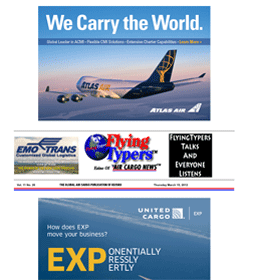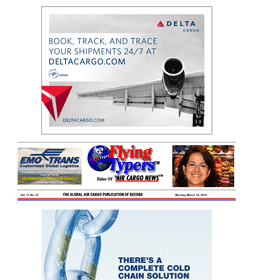 |
 |
|
| |
||
|
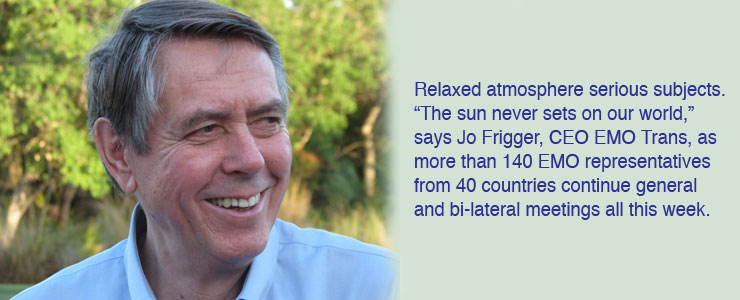 |
One such company that has grown by leaps
and bounds during the past half dozen years is EMO Trans.
This medium-sized logistics company charts
its own course while building new horizons; it even bucks the trend
by continuing a global growth pattern unequaled by most others.
EMO's Annual Meeting begins this week
in Fort Myers, Florida.
Although the event is a closed-door affair,
open only to EMO Managers and network partners who gather here from
points all over the world, FlyingTypers was granted access as we spoke
to Joachim Frigger EMO Trans Chairman & CEO.
For the record, EMO began providing professional
airfreight services in Germany in 1965.
Since that time, EMO capabilities have
expanded to include virtually every facet of worldwide shipping.
But as Mr. Frigger notes right away:
"One thing about EMO Trans does not
change:
“From top to bottom and everywhere
in between, our company remains dedicated to providing door-to-door
solutions for each individual customer.
"We have kept close to our customers
in practice even as we have expanded into China, Latin America, India,
and Southeast Asia.”
Last year EMO gained attention worldwide
when the company was honored as the top Lufthansa Cargo USA Business
Partner, besting a group that includes fifteen forwarders serving the
German national
carrier.
Criterion for the prestigious Lufthansa
Cargo Award includes booking quality (meaning booked freight matched
with what was actually delivered), no show ratio, and on-time delivery.
"We of course were and continue to
be quite happy and proud to have received this recognition.
"It is always EMO Trans’ goal
to provide excellence and total care every step of the way to both our
customers and service partners.
"The recognition belongs to our entire
team for delivering flexibility, customized programs and personalized
service," Mr. Frigger said.
As to what lies ahead for EMO Trans in
2012, Mr. Frigger, although optimistic, is also cautious:
"A little bit too early to call 2012
just yet. The first quarter is strong but this is a time of uncertainty.
"Last year (2011) was excellent for
us and 2012 has begun well, but it's early yet.
"One thing is for certain.
"I have just completed my annual
around the world journey and am quite confident that EMO Trans service
growth will continue in Asia, India, and Latin America, as well as Europe.
"We are quite excited that our new
IT system, which represents a considerable investment in the future,
will create not only state of the art transparency but also the tools
that will help us to serve our customers even better.
"But no matter the electronic and
automated aids that extend our reach in service delivery at EMO Trans,
we will still continue to ride the horse that brought us down the road,
do our work and stay close to our customers the old fashion way.
"Job one will always be working hard
to achieve customer satisfaction.
"EMO Trans carries any type of cargo,
but we are not just commodity driven; we focus rather more on global
markets with our reliable network partners.
“Our yearly global network meetings
like this one in beautiful Bonita Springs provide us with the opportunity
to strengthen relationships, make new friends, and explore new opportunities.
Our service industry, despite all the technical bells and whistles,
is still a people business and companies don't form relationships—people
do."
"But it is not an easy ride in 2012,
as many in air cargo and other modes of transport have already discovered
this year.
"The major business challenges for
us are in pricing and space.
"The carriers sometimes still don't
understand the combined power of a global alliance like ours, and we
are gaining recognition by inviting a number of air and ocean carriers
to our events.
"Our size allows us to provide real
personalized service to all our customers as held up by our continued
growth even in markets that, for others, are heading downward.
"In terms of our global view on industry
issues, security compliance, and other governmental and industry challenges,
they will need to be further addressed with an eye toward global solutions
as have been described at the recent U.S. freight forwarders meetings
and also at IATA WCS in KL.
"Our view is that true and continued
cooperation across the board will drive transportation services to real
growth in the future.
"Open dialogue with the goal of better
understanding and appreciation of each case as unique is a critical
part of what has worked for EMO Trans," Jo Frigger said.
Geoffrey
Main Event… Season kicks off with fast growing logistics provider EMO TRANS conducting 11th Global Network Meeting all this week in Bonita Springs, Florida USA.
|
|
Profits Ja!
|
|
In terms of 2012, what
stood out and continues to represent a major challenge for FRA hub
is the court imposed night flight ban, due for a decision by a federal
court in Leipzig on April 5. As Garnadt reiterated, the financial
damage alone is significant, to the tune of 40 million Euros in profit—as
he put it into context, over ten years, it will equal the cost of
a B777 aircraft. Lufthansa Cargo’s success depends on express
shipments coming from 300 destinations worldwide, 70 percent of which
are transiting through FRA. The hub has been carefully built up over
an period of 30-40 years into what it is today, enabling the processing
of an express shipment in a three-hour window. Garnadt was emphatic
about FRA being indispensable and irreplaceable for the carrier, as
viable alternatives cannot be replicated in the short term, nor freighters
separated from cargo carrying passenger aircraft. Just in case the
point hadn’t been sufficiently driven home, he reminded the
audience that out of the world’s top 10 airports, FRA was the
only one that has a curfew.
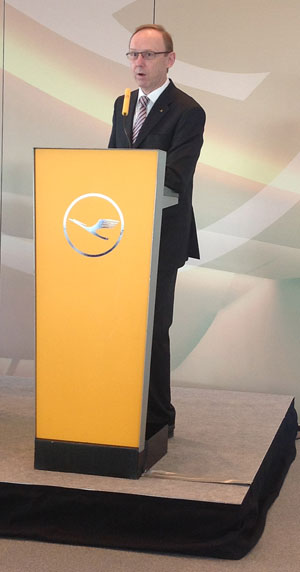 Garnadt
added that an unfavorable court decision will result in scaling back
development of the future hub and that Munich has seen continued growth;
he also stressed that the Rhein-Main region where Frankfurt is located
lives off of international trade and losing the night flights has
a severe impact on many companies and thousands of employees based
in Frankfurt. Arguments by the curfew supporters about the new landing-only
runway opened last October were spurious because it was never intended
for use on nighttime cargo flights—flight operations were to
continue on the pre-existing runways.
Garnadt
added that an unfavorable court decision will result in scaling back
development of the future hub and that Munich has seen continued growth;
he also stressed that the Rhein-Main region where Frankfurt is located
lives off of international trade and losing the night flights has
a severe impact on many companies and thousands of employees based
in Frankfurt. Arguments by the curfew supporters about the new landing-only
runway opened last October were spurious because it was never intended
for use on nighttime cargo flights—flight operations were to
continue on the pre-existing runways.
Internal studies have revealed that
general air cargo was twenty times more expensive than ocean freight,
with express cargo being fifty times more expensive than ocean freight.
Continuing to provide express service through FRA is critical for
the carrier. As example, the Chicago freighter carries about 30 percent
express freight generated in the immediate area around FRA.
Another thorny issue is the emission
trading scheme imposed by the European Union, which Mr. Garnadt attacked
in no uncertain terms, essentially accusing politicians of letting
political conflicts play out on the back of businesses such as Airbus
and Lufthansa Cargo. As countries outside the EU vigorously objected
to and are fighting this rigid regime, refusing to be dictated to
by EU bureaucrats, the spillover effect has been felt when it comes
to negotiating traffic and overflight rights with non-EU other countries.
High oil prices continue to dramatically
increase the carrier’s fuel bill, and last but certainly not
least, Jade Cargo has become a topic on which many questions are concerned.
Herr Garnadt went on to say that Lufthansa Cargo, which holds a 25
percent stake in Jade, has been negotiating with UniTop, a Chinese
partner that holds its own AOC (airline operating certificate) and
logistics interest to restructure Jade and prepare to re-launch operations.
No further financial impact is foreseen in 2012, following a double
digit negative millions figure last year, which had depressed results.
Commitment to China however remains strong, with service to eight
destinations, including HKG, a handling joint venture in Shenzhen
and Pudong and further cooperation with Air China.
As part of the Lufthansa group-wide
SCORE improvement program aiming to improve the cost structure by
1.5 billion Euros by 2015, Lufthansa Cargo’s share is 70 million
Euros, a sum that may be seem disproportionally low, but needs to
be seen in the context of much earlier significant cost control measures
that had already been implemented by Cargo.
Renewed focus on the core business has
resulted in the sale of several businesses, including LifeConEx, Traxon,
and TAT [Tianjin air cargo terminal]. In summing up, Garnadt expressed
cautious optimism for 2012, setting the course for growth, sustained
profitability, and maintenance of an industry leadership position
through the ‘Lufthansa Cargo 2020’ corporate strategy
program and its six components: fleet development, the Frankfurt hub,
modernizing its IT platform, eCargo, quality lean logistics, and finally,
cooperation with its airline partners.
We asked Herr Garnadt for information
regarding the new IT platform, the provider and a timeline.
“We have completed the selection
process and have started the negotiation with the vendor. We expect
an announcement in a May-June time frame. The new system will be rolled
out for cut over toward the end of 2014 or early 2015.”
As for why Lufthansa sold Traxon, a
company that was strategic for Lufthansa for nearly twenty years,
Herr Garnadt had this to say:
“To grow Traxon requires further
investments; when the choice is to rather invest in aircraft, the
decision and priorities become pretty clear. We continue to work with
Traxon just as before the transition,” said Herr Garnadt. He
also informed FlyingTypers that the new Detroit freighter
service, which was launched at the outset of 2012, is “meeting
our expectations and our customers are satisfied.”
Peter Gerber, Lufthansa Cargo Board
Member Finance and Human Resources, highlighted in his remarks the
fact that yields have stabilized and were holding, yet due to the
prevailing market conditions, cost flexibility was a must in order
to react very quickly to changing conditions. Revenues rose by a total
7 percent, with the biggest contribution in the Americas at 23 percent,
followed by Europe (14 percent), Africa/Middle East (7 percent) and
a -4 percent for Asia/Pacific.
Looking back to 2005, Lufthansa Cargo
achieved a stable development in operating results and the sole negative
of 171 million Euros in 2009. 2005 versus 2010 represented a trebling
of the results, from 108 to 310 million Euros, and from 2008 to 2010
figures doubled from 164 to 310 million Euros.
Herr Gerber echoed the importance of
the 2020 strategic goals of the group-wide SCORE program
On the costs side, for example, these rose by 7.1 percent, of which
jet fuel alone counted for 38 percent. Fuel prices alone translated
to a 50 percent variable for operating the MD11F. The carrier currently
employs 4,600 staff globally, a modest 3 percent increase year-on-year
2010 at 2 percent of the total costs.
A recurring topic during the interview
was the backlash from Russia in particular, with 11 out of 30 weekly
flights in the summer schedule pending approval by the Russian authorities
in what is seen as retaliation for the unilateral EU emission trading
scheme. AeroLogic, a cargo airline in which Lufthansa Cargo has a
50 percent stake, operates about 30 flights a week, and is also awaiting
approval. In response to a question, Karl Ulrich Garnadt commented
that Russian overflight approvals are habitually received late; there
are currently two weeks before the summer schedule becomes effective.
At the government level, this matter needs to also be taken up with
ICAO.
Another thorny issue raised was the
Air Cargo Germany and Air Bridge Cargo situation, for which an LBA
(German FAA equivalent) decision was pending. Herr Garnadt said that
he didn’t mind competition; however, it had to be a level playing
field for all and ensure that attempts to circumvent German ownership
laws are appropriately scrutinized.
Peter Gerber denied that Lufthansa Cargo was
focusing on part-time and contract labor and said that any future
investments and/or divestitures are being evaluated on an ongoing
basis.
In closing, regarding the e-Freight
subject Herr Garnadt made reference to the recently concluded IATA
WCS in Kuala Lumpur, indicating that he was optimistic that this time
there was collective, across the board agreement that progress must
be made lest further market share be lost by airlines and forwarders,
something the industry could ill afford.
The press conference ended with Nils
Haupt, Lufthansa Cargo Director of Communications, introducing his
successor, Matthias Eberle, who takes over effective April 1, 2012,
with Nils taking on new responsibilities with Lufthansa in New York.
Ted Braun
Get
On Board Air Cargo News FlyingTypers |
If
You Missed Any Of The Previous 3 Issues Of FlyingTypers |
|||||
|
|||||
FT031512 |
FT032112 |
||||
|---|---|---|---|---|---|



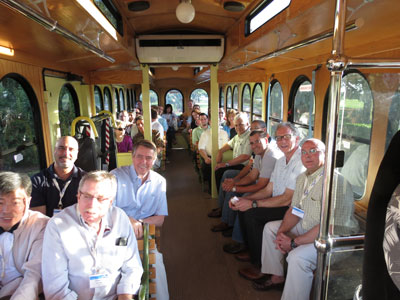



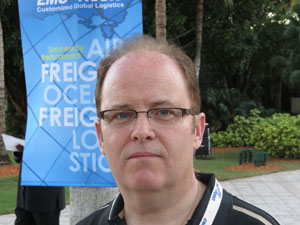
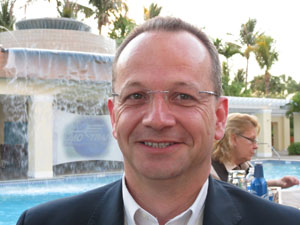

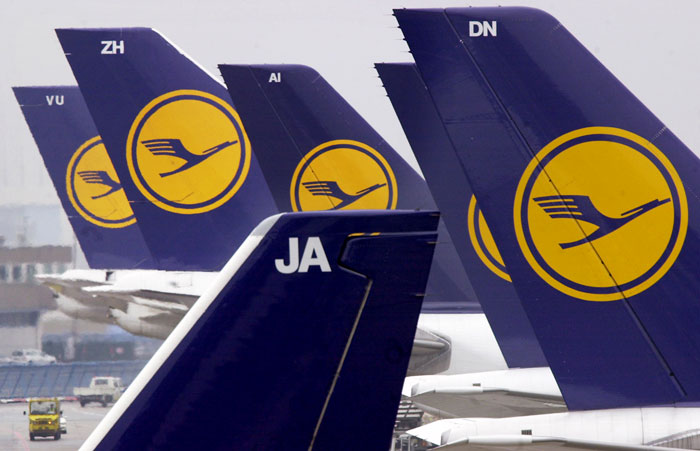
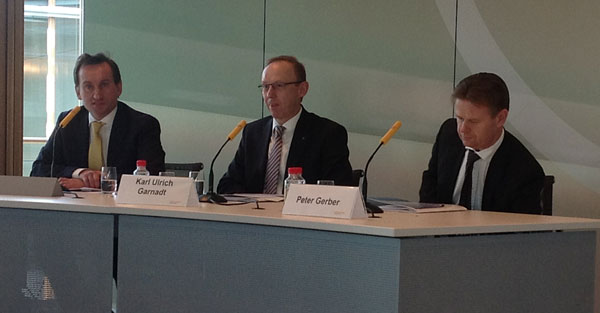 Left
to right—Nils Haupt, Karl-Ulrich Garnadt and Peter Gerber
Left
to right—Nils Haupt, Karl-Ulrich Garnadt and Peter Gerber